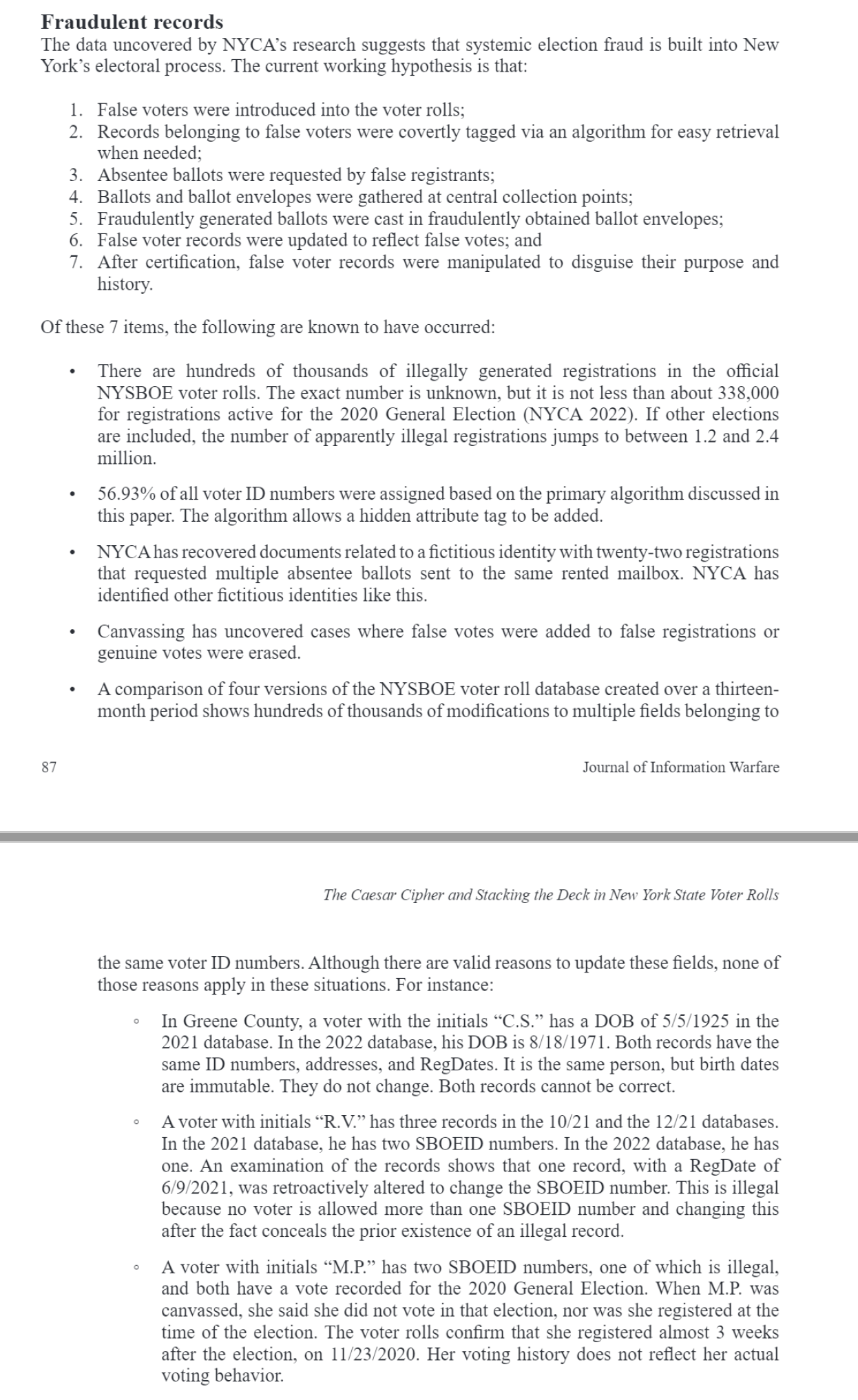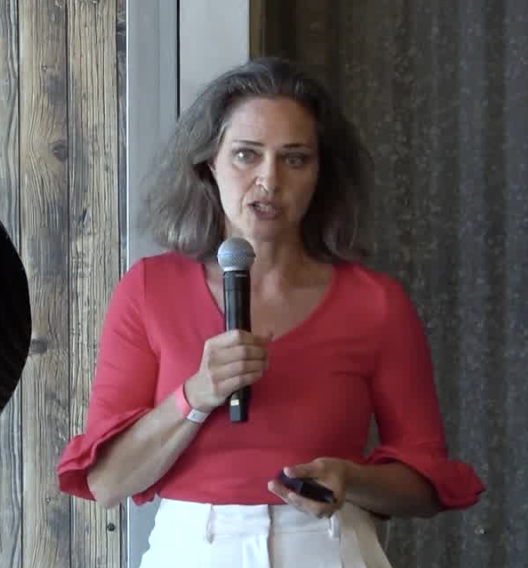A peer-reviewed study in the Journal of Information Warfare (JIW) confirms a "Loss of Control" breach has occurred in the NYSVoter Database. A peer-reviewed paper of their results in a respected journal is a hard-won and "significant milestone," according to Marly Hornik, Executive Director of the NY Citizens Audit.
The audit of the voter rolls was led by Marly Hornik and Andrew Paquette, Ph.D., Director of Research, who submitted the paper to JIW. Paquette "co-founded the International Game Architecture and Design Academy (now BUAS) in the Netherlands after a career in the feature film and video game industries. He received his Ph.D. from King's College, London, in 2018 for a thesis on the development of expertise."
In July 2021, Hornik and Paquette assembled a group of volunteers in New York that has grown to around 2000 individuals statewide to investigate the state's voter registration rolls. Hornik presented the group's preliminary findings to attendees at The Pit, sponsored by True the Vote, in August 2022.
In her recent letter to New York citizens, Hornik explains the seriousness of the group's findings:
"Through auditing the voter roll databases, obtained directly from state and local boards of elections, we have uncovered millions of invalid registrations, hundreds of thousands of votes cast by legally invalid registrations, hundreds of thousands of votes cast by legally invalid registrants, massive vote discrepancies, and the clear presence of algorithmic patterns we reverse engineered from within the state's own official records.
To be absolutely clear, there is no known innocent purpose or explanation for why these algorithms exist. I am told by cyber-intelligence experts they indicate a 'Total Loss of Control' data breach, the most severe kind of data breach recognized by our federal government. The law says it renders the affected NYSVoter database completely untrustworthy."
New York Voter Registration Rolls Show a Catastrophic "Loss of Control Breach"
The "Loss of Control Breach" references standards published by the United States Computer Emergency Readiness Team (US-CERT) that reflect the level of impact of a given information security event where data has been compromised. According to the US-CERT Federal Incident Notification Guidelines, "the document provides guidance to Federal Government departments and agencies (D/As); state, local, tribal, and territorial government entities; Information Sharing and Analysis Organizations; and foreign, commercial, and private-sector organizations for submitting incident notifications to the National Cybersecurity and Communications Integration Center (NCCIC)/United States Computer Emergency Readiness Team (US-CERT)."
A "Loss of Control Breach" is a catastrophic level of "impact," both functionally and in terms of information lost. It is important to note that the designation indicates "recovery from such an incident is not possible."

 US-Cert Federal Incident Notification Guidelines
US-Cert Federal Incident Notification Guidelines
Journal of Information Warfare: Three Experts Agree With Paquette's Paper
Paquette submitted a paper to the JIW summarizing the findings from the NY Citizens Audit. He says it took about "six months to see his article through the review process." It was the second journal to which he submitted his paper. The first was rejected "for political reasons," according to Paquette.
Paquette published a substack on May 17 about the significance of the peer-reviewed paper mentioning that he has "learned more about the algorithm" since he submitted his paper to JIW. Paquette also summarized his investigation in his May 22, 2023, article for the American Thinker.
In his Substack, Paquette comments on the significance of the paper's peer review and publication:
"The point of peer review is not to rubber stamp an article (though that may happen at lower quality journals); the point is to perform a thorough check of the article to be sure it is accurate and represents a fair description of the facts both pro and con related to the subject.
Because peer review is a rigorous process, and reviewers tend to be experts, getting through peer review can be likened to putting three expert witnesses on the stand in a court of law to attest to the accuracy of the material."
Paquette's paper was reviewed by three peer experts from the JIW who confirmed his analysis was correct with only "minor corrections," explained Hornik. The article in the Journal of Information Warfare (JIW), Volume 22, Issue 2, is entitled "The Caesar Cipher and Stacking the Deck in the New York State Voter Rolls" by Andrew Paquette.
According to the JIW peer-reviewed paper, "New York State voters are assigned two identification numbers. This study has discovered strong evidence that both numbers have been algorithmically manipulated to produce steganographically concealed record attribute information." The "secret fraudulent phantom voter infrastructure" allows for the manipulation of elections in a way that is not easily detectable. Dirty voter rolls are often a primary vector for election fraud.
The excerpt below from the JIW paper discusses what seems to be a purposeful alteration of voter registration data to manipulate elections.
 JIW/Pp. 87,88/Dr. Andrew Paquette/Peer-reviewed paper on NY State Voter Rolls for 2020 election
JIW/Pp. 87,88/Dr. Andrew Paquette/Peer-reviewed paper on NY State Voter Rolls for 2020 election
The paper also describes findings from the NY Citizens Audit "suggest[ing] that systemic election fraud is built into New York's electoral process." Algorithms were found in all 62 counties in New York. Notably, the presence of steganographically concealed records "renders the state's elections illegal on their face," explained Hornik.
Two-Plus Years of Persistence and Follow-Through
Volunteers from the NY Citizens Audit investigated New York's voter registration rolls after the 2020 election only to find that "New York elections massively violate state and federal law," according to Hornik. The group's "Deficits Report" showed evidence of falsifying records, registrations with no trackable records, ineligible registrations, phantom voters, and many inaccuracies and discrepancies in the registrations that effectively make the rolls completely unreliable in terms of reflecting actual, registered voters in the state. Their investigation led to a Resolution for Audit requesting a "complete end-to-end audit of the New York State 2022 General Election."
 Marly Hornik/The Pit
Marly Hornik/The Pit
UncoverDC has closely followed the group's work and touched base with Hornik again on May 19. Hornik and her volunteers have been actively campaigning at the Capitol in Albany since January 2023 "in order to educate our legislators about our findings, stated in our critically important report, "A Study in Deficits," summarized here. The "Study in Deficits" report was delivered on January 24, 2023, to 89 members of the New York State Assembly.
Following the submission of the "Study in Deficits report," Hornik and her volunteers persisted, making "follow-up calls and sending emails to arrange a presentation to the members of the Election Committees of both the Assembly and the Senate. Special efforts were made to communicate comprehensively with the senior staff of Assembly Member Latrice M. Walker, Chair of the Election Law Committee in the Assembly, and Senator Zellnor Y. Myrie, Chair of the Senate Election Committee," according to Hornik.
Remarkably, Hornik and Paquette ultimately secured a presentation with Election Committee members from each Chamber with a Democratic majority State Assembly. The presentation, "A Technical Briefing: NYSVoter Type 2 Data Breach," was given on May 1, 2023, in the Legislative Office Building in Albany. Some members could not attend because of the finalization of the state budget that same day. For those who could not attend, a link to a video from the briefing was sent on May 6 to each member.
On May 22, according to Hornik, "a visit was made to Albany to inquire if any action will be taken by the Election Committees of the Assembly and the Senate in order to address the critically important findings that the New York State voter database has been breached. The senior staff of the Chairs of both committees did not offer any assurance that action would be taken." The Legislative Session ends on June 8.
Hornik is now leading a nationwide initiative to replicate what she and her team have done in New York. She says, in many cases, "the American people have already done the work." She says it is time to review the findings, meet with legislators, and bring litigation where appropriate. Hornik says she plans to "hold election officials accountable" wherever possible.


